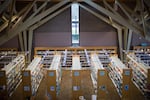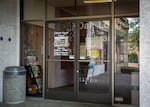It’s been nearly two months since Oregon Gov. Kate Brown ordered residents to stay home to curb the spread of COVID-19. And now a majority of the state’s counties have moved forward to reopen their economies.
While many are excited to return to their favorite brunch spot or to fix a home haircut gone wrong, avid readers are left wondering when they can safely return to their local library.

Signs alert patrons that the book drop is closed at the Woodstock branch of the Multnomah County Library in Portland, Ore., on Wednesday, April 29, 2020. Libraries across Oregon closed their doors and hit pause on due dates in response to the statewide stay-at-home order issues in late March 2020.
Bryan M. Vance / OPB
Having fun isn't hard when you've got a library card
While library buildings have closed their doors to the public, librarians are still hard at work serving communities online. Libraries throughout the state have been able to end late fees, increase virtual programming and collections, and transition staff to digital roles to help answer technical questions.
For those who don't already have a library card, most libraries offer sign-ups for virtual library cards to access their content.
As people self-isolate at home, digital usage has increased dramatically in some parts of the state: the Washington County Cooperative Library Services reported a 115% increase in March for new ebook and audiobook users compared to March 2019; libraries in Eugene saw a bump of over 50% for their eResources in April. Libraries have also been able to expand resources such as Ancestry for at-home use.
"We really want to be inclusive and access-focused: to be able to open our doors as wide as we can virtually, when we know we can't open them physically," said Eugene Public Library Director Will O' Hearn.
“We’re going to be flexible as heck — we’ve waived all the fines and extended due dates because we just want people to have as much access as possible.”
Along with digital services, librarians have adapted regular programming for online settings, such as storytimes via Facebook Live, local author fairs, poetry slams, and virtual spaces for seniors to chat. At the Beaverton City Library, parents can sign children up to receive a letter from a librarian to get book recommendations.
While the buildings remain closed, summer reading programs are still on track at Multnomah County Libraries and several other libraries throughout the state where youth can log when they read or listen to a book for prizes.
While most larger library systems in metropolitan areas have asked patrons to hold on to their books until they reopen, smaller libraries like the Pendleton Public Library have been able to continue with limited curbside service. Libraries in McMinnville, Corvallis and Ukiah have even been able to do home delivery.

Looking over the stacks at the Sherwood Public Library, part of the Washington County Cooperative Library Services system, in Sherwood, Ore., on Monday, Jan. 7, 2019.
Bryan M. Vance / OPB
Rural, underserved communities still face a digital divide
While libraries have been able to supplement books and resources online, digital isn't a cure-all for everyone. When the Corvallis Public Library started home delivery in early May, they received nearly 700 requests. The desire for physical books is a shared sentiment among readers and librarians alike.
“As much as people are enjoying the digital, there’s a lot of hunger for print books, and as a print book reader myself I understand,” said Lisa Tattersall, manager for WCCLS in Washington County. “So much of this is going to come down to logistics, staffing — ultimately the main driver is [the] governor’s orders and what our county public health officials recommend.”
Libraries are themselves a digital access point for people in many parts of the state where broadband and wi-fi networks are few and far between. Libraries become a critical service amid mass layoffs and closures when essential needs like applying for unemployment can prove to be difficult for those without access to technology like a computer or an internet connection.
“One of the things that has been most troubling for public libraries is that we are often that bridge for people who don’t have access to technology,” said Erin McCusker, Umatilla County Special Library District’s director.
McCusker said some of the libraries in her district have struggled to provide internet hotspots because they've all been checked out. While urban parts of the state have seen large spikes in online usage, libraries in her district in eastern Oregon haven't seen much change. As more libraries move forward through the governor's phased plan, computer access will likely be incremental. On Monday, the Pendleton Public Library said they could open computer-use by appointment only.
Inaccessible technology isn’t just a problem unique to rural communities, but for lower-income and underserved families as well. Beaverton City Library Director Glenn Ferdman is working to get books into the hands of school-aged children at meal distribution sites within the Beaverton School District since they already have the infrastructure to provide food following the governor’s orders.
“Many of them don’t have broadband internet connections from home, or they have limited access to computers because they’re being shared by parents working at home, and children doing their schoolwork at home,” Ferdman said. “There’s a need to provide additional reading materials, to get them into the hands of these folks.”
WCCLS may not just loan but actually give away free books to children throughout the county at summer meal sites.

The Oak Lodge branch of the Clackamas County Library in Oak Grove, Ore., alerts patrons that it's closed on Wednesday, April 29, 2020. Clackamas County closed its public libraries due to the ongoing coronavirus pandemic.
Bryan M. Vance / OPB
Turning the page on coronavirus
Like many other public settings, opening a library is a logistical challenge amid a pandemic. According to State Librarian Jennifer Patterson, libraries will reopen individually on a case by case basis, following guidance from their respective local health authorities and governing bodies.
Libraries will reopen in phases, with incremental services to start. The Hood River County Library District and Jackson County Library Services have laid out plans for gradual reopening. They include reimplementing curbside pickup, home delivery, and limited computer access by appointment once it's safe to do. People will have limited access to buildings based on their size, and casual browsing likely won't be available to start.
Some library buildings in more population-dense areas will likely remain closed through Phase One of the governor's plan as library staff begins to implement safety and sanitation procedures consistent with guidance from the Oregon Health Authority and the Centers for Disease Control and Prevention.
The Josephine Community Library in Grants Pass announced Monday it would begin to open book drops May 28, where it anticipates the return of more than 15,000 items for quarantining and sanitizing.
“The first step is to restart circulation by opening the books drops and sanitizing the returned items to make them safe for check out again,” said library director Kate Lasky in a statement.

A lock on the book return box at the Lake Oswego Public Library in Lake Oswego, Ore., on Wednesday, April 29, 2020. Lake Oswego closed its public library in response to the coronavirus pandemic.
Bryan M. Vance / OPB
The handling of library materials can be tricky. Public health officials acknowledge there’s a lot that’s still unknown about the novel coronavirus, including how it behaves on physical objects like library books — and that in turn, has an effect on how to handle shared materials. The curbside service at the Pendleton Public Library has been able to implement designated book drops where books are quarantined for 72 hours and sanitized before returning to the shelf. Hood River County librarians quarantine new additions to their catalog for two 72-hour quarantine periods.
The Multnomah County Library is among a number of systems waiting on a study underway in Ohio. The Columbus Metropolitan Library is working with science research firm Battelle to purposely contaminate library materials with the coronavirus to determine how long it remains viable on surfaces.
“This research will greatly help libraries understand safe materials handling procedures for reopening and beyond,” said Multnomah County Library communications director Shawn Cunningham.
Regardless of how each library will look like, librarians are excited to welcome back patrons, even if it’s from a distance.
